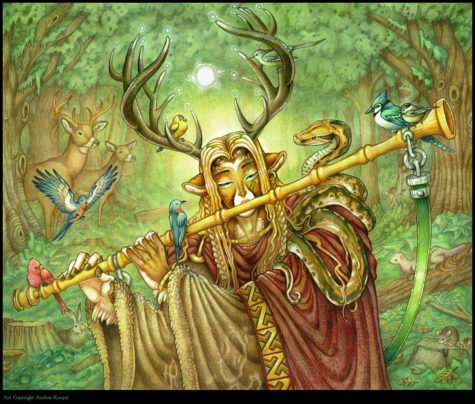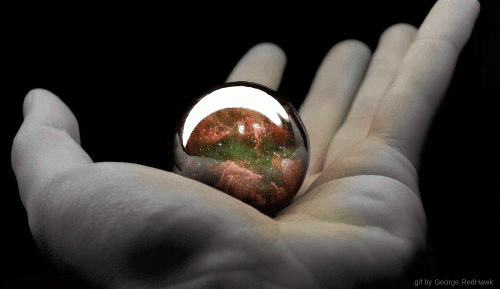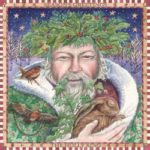Below are listed some of the animals denoted by Celtic Shamanism and Druidism along with their spiritual denotation:
Adder, Snake (Nadredd):
The snake has long been associated with wisdom, reincarnation, and cunning. The Poisonous adder of the British Isles has the same reputation. Although there were no snakes in Ireland, the Irish Celts knew about them. The Druids were known in Wales as Nadredd. The Druids also carried an amulet called gloine nathair (Serpent Glass); which was supposed to be formed from the eggs of an adder.
Badger (Breach):
This animal is unyielding in the face of danger and is noted for its tenacity and courage. In the Welsh tale of Pwyll’s courting of Rhiannon, a badger is mentioned as a guide during dreaming. The badger will teach you to fight for your rites and defend your spiritual ideas.
Bat:
Associated with the underworld or Awwyn, as the bats radar guides it through the night avoiding obstacles and barriers, so it can teach you to do the same.
Bear (Arth):
Although the bear was native to the Isles, it is now extinct there. The word Arth, means bear, which is the root word for the name Arthur. The bear was noted for its strength and stamina. It is said to help give you balance in life and the strength to do what is necessary.
Bee (Beach):
The bee is revered as industrious, single minded when performing a task, and fearless when defending its home.
Blackbird (Druid-dhubh, Lon Duhb):
Legends say that the birds of Rhiannan are three blackbirds, which sit and sing in the World Tree of the Otherworlds. Their singing puts the listener into a sleep or a trance which enables him/her to travel to the Otherworld. It was said to impart mystic secrets.
Boar (Bacrie):
Important in the arts and myths of the Celtic people, the boar was known for its cunning and ferocious nature. A famous legendary boar was Orc Triath, which the goddess Brigit owned. In the Arthurian tales of the Mabinogion the boar Twrch Trwyth was a terrible foe to Arthur. The White Boar of Marvan sent inspiration to its master to write music and poetry.
Bull (Tarbh):
A common animal figure in Celtic mythology, the bull symbolizes strength and potency. Certain divination rituals required the sacrifice of a white bull. In the tale of the Tain Bo Cuailgne (Cattle raid of Cooley), two special bulls are coveted by two rulers. The Tar-roo-Ushtey (Water bull) is said to haunt the Isle of Man.
Butterfly:
In many cultures the butterfly is thought to be the souls of the dead and keepers of power. There is said to be no negative energies experienced in any Otherworld area when there is the presence of butterflies. It is said that they will help you to view matters with greater clarity.
Cat (Caoit, Cat):
Many of the Celtic legends picture the cat as a ferocious, evil creature, but that may have been because cats at that time were untamed. In Ireland Finn mac Cumhail was said to have fought a clan of “cat-headed” people. The cat is a strong protector, especially when placed in confrontation.
Cock:
In several Celtic legends the cock chases away ghosts and unwanted spirits by his crowing at dawn. It represents the power of the word to dispel negativity.
Cow (Bo):
Once so important to the Celts it was used as a form of currency or monetary exchange. Ancient Irish lords were known as bo-aire or cow-lord. The cow was sacred to the goddess Brigit. The cow symbolizes contentedness, defending the inner child, and providing for daily needs.
Crane:
At one time the crane was a common animal in the British Isles. One later Celtic tradition, apparently originated after the arrival of Christianity, is that cranes are people who are paying a penance for some wrong doing. The crane is associated with the Cailleach and Manannan Mac Lir, who made his crane bag from its skin. The crane with its colors of black, white, and red, was a moon bird, sacred to the Triple Goddess. Magick, shamanic travel, learning and keeping secrets, reaching deeper mysteries and truths is said to be taught by the crane.
Crow (Badb):
This animal is to be treated with care. Along with the raven, the crow is a symbol of conflict and death, an ill-omen associated with such Goddess as Macha, Badb, and Morrigan. The Irish word for crow is badb, which is also the name of a Celtic war Goddess. Although the crow was ill-omened, it was also considered to be skillful, cunning, and a bringer of knowledge. It teaches you to learn from the past, but not to hold onto it. It is of most value when trickery is in need.
Deer (Abhach) or Stag (Sailetheach):
In its form of the white doe or white stag, the deer was often a messenger and guide from the Otherworld. Following such an animal led the unsuspecting human into contact with supernatural beings. The antlered headdress of Cernunnos is a symbol of the stags stature. The deer represents keen scent, grace, swiftness, and gentleness. These are the ways of reaching our goals without using force.
Dog (Abach, Mada) or Hound (Cu):
Devoted hounds are often mentioned in Celtic myth, such as Bran and Sceolan which belonged to Finn mac Cumhail. Underworld hounds, such as the Welsh Cwn Annwn belonged to Arawn, are always white with red ears. The Underworld Hounds run down and punish the guilty. Dogs represent tracking skills, the ability to scent a trail, and companionship.
Dolphin:
This creature was associated with the sea deities. It deals with dreams and harmony, and recognizing and balancing the rhythms of your body with those of nature.
Dragon (Piastras, payshtha, Horn):
The dragon in Celtic-British mythology has more varieties than the standard legged form; it is sometimes represented as a water serpent or worm-shaped beast. There are many references to serpents or dragons in Celtic myth. On many occasions the Fianna fought huge dragons in lakes. Most cultures consider the dragon a benevolent dweller of caves, lakes, and the inner Earth. It was an ancient symbol of wealth. The dragon symbolizes the power of the Elements, especially that of the Earth, but also of the treasure of the subconscious mind.
Eagle (Lolair):
A bird noted for wisdom and long life in Celtic stories. The eagle represents swiftness, strength, keen sight, and the knowledge of magick. It helps you to see hidden spiritual truths.
Eel (As-chu):
One of many stories in which the eel is mentioned is the story of the swineherds who battled through a variety of shape-shifting forms. In their final forms as eels, the swineherds were swallowed by cows who later gave birth to magickal bulls. Cu Chulainn’s spear Gae-Bolga got its name from the eel. The eel symbolizes adaptability, wisdom, inspiration, and defense.
Fox (Mada Rua):
In Taliesin’s Song of His Origins, the Bard says he assumed the shape of a satirizing fox, a reference to the cunning, slyness, and ability of the fox to make fools out of those who chase it. The ability to watch the motivations and movements of others while remaining unobserved is the skill which we may learn from the fox.
Frog:
In many cultures the frog is a symbol of magick. It can teach you to leap swiftly from one level of consciousness to another, from this world to the Otherworld. The frog can also help you find the courage to accept new ideas, nurture yourself, and find connections between ideas.
Hare or Rabbit (Coinin):
An animal sacred to the Goddess Andraste in particular. Its movements were sometimes used for divination; Boudicia used a hare this way just before her last battle with the Romans. It is associated with transformation, the receiving of hidden teachings, and intuitive messages.
Hawk (Aracos):
Celtic oral tradition lists the oldest animal as the Hawk of Achill. As with other birds, the hawk is a messenger between the Otherworld and this world. However, it is of greater skill and strength than other birds. It symbolizes clear sightedness and longevity of the memory. If you hear a hawk cry during a journey, be alert to upcoming situations that need boldness and decisiveness to keep from being thrown off balance.
Horse (Cab-all, Capall):
A popular animal of the Celts. Sacred to the Goddesses Epona and Rhiannon. The horse was considered to be a faithful guide to the Otherworld. It symbolizes stamina, endurance, and faithfulness.
Lizard:
The lizard symbolizes the shadowy plane of manifestation where events are constantly changing shapes and patterns. If you see a lizard on a journey, be alert to all below the surface activities going on around you.
Lynx:
This creature is considered the keeper of deep secrets and hidden knowledge. It can help with divinatory skills and the development of psychic senses. Sometimes it symbolizes the need to look deeper within yourself to see that which is often hidden.
Magpie:
This bird is said to deal with omens and prophecies, as well as the mysteries of life and death.
Mouse (Luch):
The mouse is often mentioned in Celtic folklore. In a Welsh story with Manawydan and Pryderi, a mouse is portrayed as the shape shifted wife of the magician Llwyd. The mouse represents secrets, cunning, shyness, and the ability to hide in times of danger.
Otter (Balgair):
These animals were considered very magickal by the Celts. Otters were said to appear and help during the voyages of Maelduine, Brendan, and others. The otter is a strong protector who helps with gaining wisdom, finding inner talents, faithfulness, and the ability to recover from any crisis.
Owl (Caillech):
These birds were most often associated with the Crone aspects of the Goddess. The word “cailleach” in the Scottish Gaelic means “owl.” The owl is often a guide to and through the Underworld, a creature of keen sight in darkness, and a silent and swift hunter. It can help unmask those who would deceive you or take advantage of you.
Pig (Muc):
A swine was considered to be the magickal, sacred food of the Tuatha De Dannan and an animal of Manannan mac Lir. In the Mabinogion Pwyll received a gift of pigs from the underworld God, Awrawn. Their later theft by Gwydion caused the death of Pwyll’s son Pryderi. The writings of Merlin say that he spoke with a little pig in visions. Symbolic of the spiritual food necessary to the Druids who were said to be swine herders.
Rat (Francach):
Rats are not mentioned in a favorable light in Celtic folklore, but they have their place. Rats are sly, sometimes aggressive, creatures who can track down whatever they seek, defending themselves ferociously.
Raven (Bran):
Take care when dealing with this bird. An important animal of the Celts. In Ireland the raven was associated with the battlefields and such Goddesses as Morrigu or the later Welsh Morrigan, just as the crow. The bird was connected with Bran the Blessed. In Welsh, bran means, “raven.” Although its reputation is dubious, it is an oracular bird. It often represents the upsets and crisis of life that are necessary for new creation.
Salmon (Brionnfhionn):
A very wise, magickal creature in Celtic lore. A salmon of great knowledge is said to swim in the Well of Segais, eating the mystical hazelnuts that fall into the well. When the Irish hero Finn mac Cumhail burned his thumb on a salmon and then put the thumb in his mouth, he gained shamanic knowledge. The salmon teaches how to get in touch with ancestral knowledge and how to put it to practical use.
Sow (Airc):
The Goddess Cerridwen was known as the White Sow. The sow was considered a very powerful creature in the Underworld. As a creature of Cerridwen, it was associated with the Sacred Cauldron and the granting of inspiration; also a creature of death and rebirth.
Squirrel:
This creature is always preparing for the future; it is said to have shown the druid how to do this in a practical way. Sometimes its appearance heralds changes, even adversities. Plan ahead so that you may always be prepared.
Swan (Eala):
A mystical bird who finds its way into several Celtic stories. Its feathers were often used in the ritual cloak of the Bards. Swans are connected with music and song. Swans also help with the interpretation of dream symbols, transitions, and spiritual evolution.
Turtle:
The turtle is a slow moving, methodical creature, carrying its protection constantly with it. It is said to teach the druid to be grounded, how to stay in tune with Earth energies, the wisdom of flowing with the cycles of life, and to be gentle with the body’s needs.
Unicorn:
This mythical Celtic creature had the body of a white horse, the legs of an antelope, tail of a lion; and a single horn on its head. It is the symbol of supreme magickal power. It teaches that every action is creation, so make every day count.
Wolf:
The wolf is a cunning, intelligent creature, capable of out thinking hunters. It can teach you how to read the signs of nature in everything, how to pass danger invisibly, how to outwit those who would wish you harm, and how to fight when needed.
Wren (Dryw, Dreoilin):
A sacred bird to the Druids specifically, its musical notes were used for divination. As with many other birds, the wren was considered a messenger from the deities.
Source: Father Oak




Great site. Was hoping you could point me to any research refrences to your description of symbolism to the frog and any other writings you know of with bran other than when referring to the raven myths,?